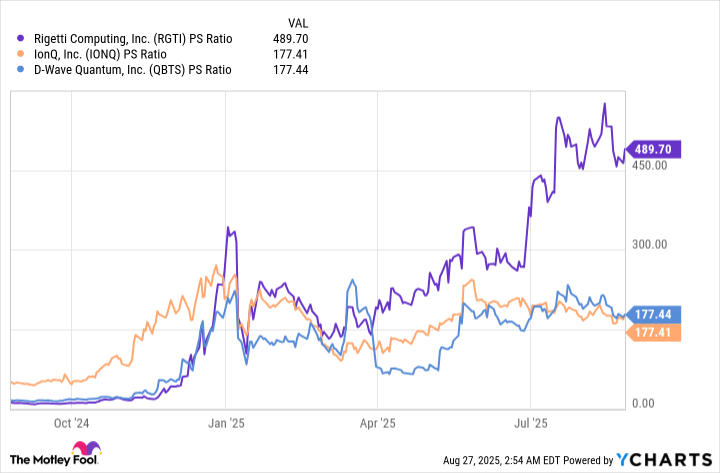
So here we are, staring at the stock ticker for Rigetti Computing (RGTI), a company that’s either on the cusp of revolutionizing the universe or destined to vanish like a quantum particle in a bad mood. Its shares have skyrocketed over 1,500% in the past year. That’s the kind of number that makes people forget about rent, groceries, and the fact that their toaster still only has one slot working.
Quantum computing, you see, is the shiny new toy of science and capitalism. It promises to solve problems so complex they make your brain hurt just thinking about them-things like curing cancer, predicting climate disasters, and maybe even figuring out why socks go missing in the dryer. But here’s the catch: quantum computers are as fragile as a snowflake in July. They’re prone to errors because the universe itself seems to conspire against them. So it goes.
The Machine That Could Save Us All-or Not
Rigetti uses superconducting qubits, which is fancy talk for “really cold circuits.” These qubits are fast and compatible with existing tech, but they’re also temperamental little beasts. The company recently unveiled its latest creation, the Cepheus-1-36Q, a multi-chip marvel that boasts half the error rate of its predecessor. Impressive, right? Sure. But let’s not kid ourselves. Progress in this field feels less like climbing a mountain and more like trying to balance a pencil on your nose while riding a unicycle.
And yet, despite the technical wizardry, Rigetti’s sales are sliding. In Q2, revenue dropped from $3.1 million to $1.8 million. Meanwhile, costs are rising faster than my blood pressure during tax season. Operating losses widened to $19.9 million. But hey, at least they’ve got half a billion dollars sitting in the bank. Cash is king until it isn’t.
The Money Problem
Here’s the thing about quantum computing: it’s expensive. Like, “sell your house and hope your kids forgive you” expensive. Rigetti’s CEO, Dr. Subodh Kulkarni, says they’re about four years away from achieving something called “quantum advantage.” This is the magical moment when quantum computers outperform classical ones in real-world tasks. Until then, Rigetti is scraping by on partnerships with universities and research labs. It’s noble work, but nobility doesn’t pay the bills.
Investors seem to believe in the dream, though. Rigetti’s price-to-sales ratio is absurdly high compared to competitors like IonQ and D-Wave Quantum. High valuations often mean high expectations-and high risks. If Rigetti burns through its cash pile without finding paying customers, well, that dream might turn into a nightmare. So it goes.

The Competition Looms Large
Let’s not forget the giants lurking in the shadows. Alphabet’s Google, for example, already built a quantum chip capable of solving a specific problem in five minutes that would take centuries for classical computers. Granted, this was a contrived benchmark designed to show off quantum superiority, but it’s still impressive. And intimidating.
Rigetti isn’t alone in this race, and the finish line keeps moving. Other companies might develop scalable quantum computers before Rigetti does. If that happens, Rigetti could find itself selling tickets to a show no one wants to attend. Investors should ask themselves: Am I willing to bet everything on a horse that hasn’t even left the stable yet?
In short, only those with nerves of steel and wallets full of patience should consider Rigetti stock. Even then, waiting for the price to drop might be the wisest move. After all, every wealth builder knows that timing is everything. And sometimes, timing means doing nothing at all. 🕰️
Read More
- Gold Rate Forecast
- 2025 Crypto Wallets: Secure, Smart, and Surprisingly Simple!
- Top 15 Insanely Popular Android Games
- Why Nio Stock Skyrocketed Today
- Did Alan Cumming Reveal Comic-Accurate Costume for AVENGERS: DOOMSDAY?
- New ‘Donkey Kong’ Movie Reportedly in the Works with Possible Release Date
- Core Scientific’s Merger Meltdown: A Gogolian Tale
- 4 Reasons to Buy Interactive Brokers Stock Like There’s No Tomorrow
- ELESTRALS AWAKENED Blends Mythology and POKÉMON (Exclusive Look)
- EUR UAH PREDICTION
2025-08-30 18:43